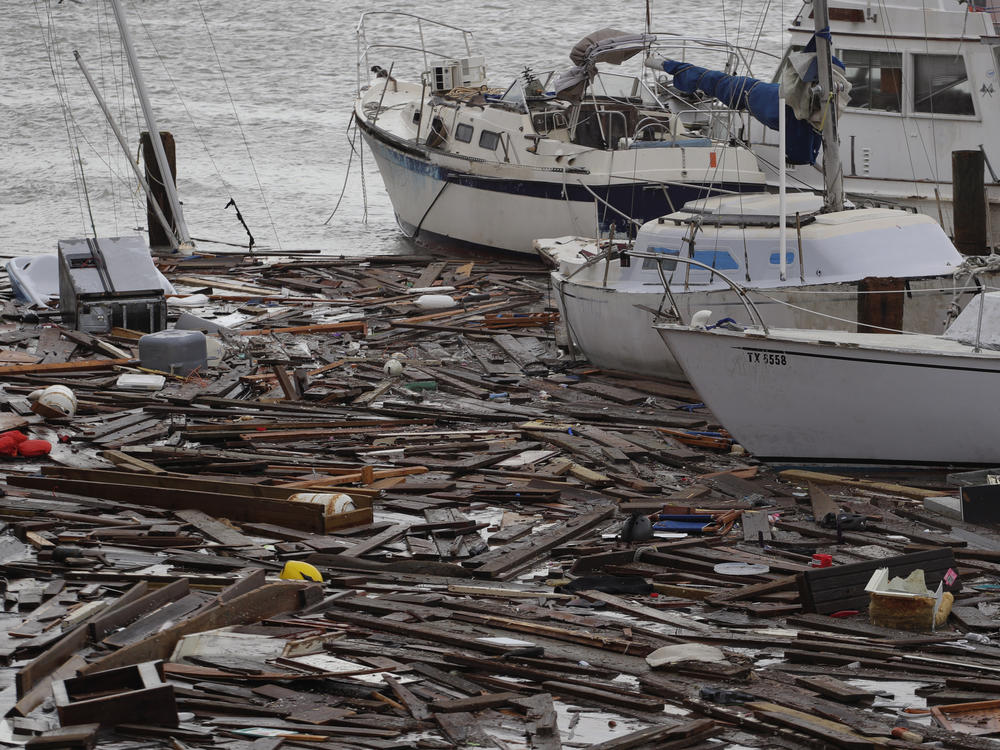Section Branding
Header Content
As Texas Reels From Hurricane Damage, Hawaii Braces For Impact
Primary Content
As Texas contends with the ongoing aftermath of one hurricane on Sunday, Hawaii is bracing for the impact of another.
Hurricane Hanna slammed into South Texas on Saturday, making landfall twice as a Category 1 storm. While it was downgraded to tropical storm status early Sunday morning, its relentless rainfall continues to pose a threat.
"Heavy rainfall from Hanna has already produced numerous reports of flash flooding across south Texas," the National Hurricane Center reported Sunday. "Additional heavy rainfall will continue to cause life-threatening flash flooding over south Texas and northern Mexico, and isolated minor to moderate river flooding in south Texas."
By early Sunday afternoon, Tropical Storm Hanna was centered near Monterrey, Mexico and was moving west-southwest at roughly 9 miles per hour, with maximum sustained winds of about 40 mph. It is expected to continue to weaken to a tropical depression as its center moves farther inland over northeastern Mexico through Sunday night, and dissipate by Monday night.
In the meantime, parts of Texas are facing the risks of heavy rain, flood warnings and potential tornadoes.
A Tornado Watch remains in effect in South Texas until 10 p.m. CDT, and the National Weather Service Storm Prediction Center said that "a couple tornadoes are possible" into the afternoon.
The storm is expected to produce 6 to 12 inches of total rain accumulations, with isolated maximum amounts of 18 inches through Monday in south Texas and parts of Mexico. It will also produce an estimated 2 to 4 inches of rain and dangerous surf swells along the upper Texas and Louisiana coasts.
Many areas were under flash flood warnings on Sunday, and more than 243,000 power outages were reported in the state as of Sunday afternoon.
The storm surge along the Texas coast is expected to diminish throughout the day, leaving coastal communities to grapple with damage inflicted Saturday by the storm's sustained 90 mph winds.
In and near Port Mansfield on the Texas coast, strong winds blew shingles off of homes and took roofs off some boat storage facilities. North Padre Island saw a sea-level rise of more than 6 feet. Storm surge overwashed dunes and dumped debris on a beach in Sargent. Rough seas caused a portion of a pier near Corpus Christi to collapse.
In a Sunday afternoon statement, Texas Gov. Greg Abbott urged people to stay vigilant and monitor flash flood warnings in South Texas and the Rio Grande Valley, even after rainfall stops, because water from upstream can impact downstream locations in the coming days.
Abbott added that the state has the "appropriate assets" in place to respond to the continuing impact of the storm. A day earlier, he announced he had issued a disaster declaration for 32 Texas counties and requested an Emergency Declaration from the federal government.
FEMA and President Trump approved the request on Sunday.
At a Saturday press conference, Abbott also stressed the dangers of people coming together to shelter or respond to the storm in a region that is simultaneously being slammed by the coronavirus pandemic.
He said at that time he had not heard of any fatalities caused by Hanna, and did not want it to stoke any potentially deadly transmission of the virus either.
"The most important thing I could say today is to issue a reminder to everybody in the state of Texas, that just because a hurricane comes to the state, does not mean that COVID-19 disappears," he said.
Hanna, the first hurricane of the Atlantic season, arrived as southeast communities were wrestling with how to plan for natural disasters on top of a public health emergency that makes emergency responses like mass evacuations and crowded shelters untenable. And it marks the beginning of what experts are predicting to be an above-average hurricane season.
Meteorologists are currently tracking another tropical disturbance in the Atlantic, off the coast of Africa, that may become a tropical depression or storm this week.
And in the Pacific, Hawaii is bracing for an imminent hurricane of its own.
Hurricane Douglas is expected to pass "dangerously close to, or over, the islands" on Sunday, bringing a "triple threat of hazards" including high winds, flooding rainfall and high surf, according to the National Hurricane Center.
A hurricane warning is in effect for Maui County, Kauai County and Oahu, and a tropical storm warning is in effect for Hawaii County.
"Hurricane conditions are expected in portions of Maui County today, on Oahu by this afternoon, and on Kauai and Niihau tonight," wrote the National Weather Service in Honolulu. "Tropical Storm conditions are imminent across the Big Island."
The NWS Forecast Service in Honolulu predicts Douglas will leave the area by Monday night.
President Trump approved Hawaii's emergency declaration on Saturday.
Like Texas, the state is also wrestling with how to protect public safety while containing the spread of the coronavirus, which has broken records in recent days.
On Saturday, Hawaii reported its largest single-day increase of 73 new coronavirus cases, constituting its third consecutive day of record numbers.
Hawaii Gov. David Ige said that across the state, 625 people in isolation of quarantine due to COVID-19 have affirmed they will shelter in place during the storm.
But he also temporarily modified the state's mandatory 14-day quarantine rule for inter-island travelers, allowing them to venture out carefully in order to prepare.
"If you are in quarantine, to the extent possible, please have supplies and materials delivered and lean on friends and family to help build your supply kit," he said. "As a last resort, you are allowed to break quarantine, but only to procure necessary supplies and materials."
The Hawaii Department of Health will not be conducting COVID-19 tests on Sunday because of the storm, but said it expects to resume testing late Monday or on Tuesday.
Copyright 2020 NPR. To see more, visit https://www.npr.org.

